Climate change

WE ARE TOLD, in the classic story of Oedipus, about the king who managed to bring devastation to his city and family, a king who, when he finally learned the truth of his crimes, blinded himself.
I thought of that epic tragedy when I read of one decision by our current ruler, one event amid all the dozens of others. And this one was less immediately tragic—it didn’t involve pulling an immigrant with a brain tumor out of a hospital for deportation, nor forcing transgender Americans to produce a birth certificate before they pee. No, this tragedy will play out over a longer time.
In early March (and, of course, late on a Friday afternoon), his new team at the Commerce Department announced that they intended to cut the climate satellite program at the National Oceanic and Atmospheric Administration by 22 percent. They proposed a lot of other terrible cuts the same day: virtually zeroing out the environmental justice programs at EPA and cutting the environmental education budget by 94 percent. But the one that future historians will, I think, obsess over is the satellites.
Consider: In the last few months, we’ve learned that 2016 set the all-time record for the hottest recorded year on planet earth. We’ve seen, over the last few years, the highest wind speeds ever recorded in one ocean basin after another, as record-hot water produces amped-up hurricanes. An iceberg a quarter the size of Wales (not a whale—Wales) is about to break off from the Larsen Ice Shelf in the Antarctic. And we’re going to blind ourselves? We’re going to start paying less attention?

REMEMBER THAT you are dust, and to dust you shall return. The prayer said around the world on Ash Wednesday wielded a rather pointed moral to the tail end of the hottest February on record where I live. Penitents in my neighborhood church shuffled in a sun-kissed line to receive ashes on tanned foreheads, summer sandals slapping the floor. Outside, overeager daffodils bloomed their Easter welcome. A strange one, this backward Lent: balmy with a side of dread.
This existential reversal felt nothing if not timely—all through the winter, a collective litany of weary newsfeeds asked whether we really needed quite so much of it. The first months of this year have witnessed a steady erosion of trust in whatever institutions we had left: the federal government, the electoral process, our checks and balances, our freedoms, our faith, each other. Some trace our hard skid sideways to the election, or the Super Bowl, or the Oscars. (I peg it to the Cubs’ win in November. I grew up in Chicagoland—I know reversing a curse has consequences.)
But there’s something particularly dizzying about the separation of church and earth. The globe is getting hotter every year now, but the effects of this ecological trauma, like any grief, are far from linear. If warming simply meant the usual weather, shifted a month early or late, we could figure out how to recalibrate—but our snowfall is breaking records and our ice caps are melting. A winter afternoon can begin as warm as an early summer day and suddenly drop 25 degrees to freezing rain.

Pricing Carbon Fuels
Thank you for your fine article on climate change (“Shattering the Silence on Climate Change” by Teresa Myers, Connie Roser-Renouf, and Edward Maibach, May 2017). There is no larger long-term challenge facing humankind. The mention of Citizen’s Climate Lobby deserves expansion. This grassroots, nonpartisan, national group has a very workable, market-friendly proposal to help us move forward: enacting a steadily rising federal fee on all carbon-based fuels (coal, oil, and natural gas). The net revenues from this fee would be returned on an equal per capita basis to all legal U.S. residents. Such a fee would correct a failure of the market to properly price the environmental and social costs associated with use of these resources. It would have a positive impact on economic growth, would favor a transition to nonpolluting energy resources, and would be fair to low-income residents.
Kenneth Piers
Grand Rapids, Michigan
The Pride of Milwaukee
One of the names in Lisa Sharon Harper’s “Find the Cost of Freedom” (May 2017) was instantly familiar to me: James Cameron, the only young man “spared” from lynching, by imprisonment. I only wish Harper could have gone further in highlighting Cameron’s life. Having lived most of my life in the Milwaukee metro area, I have heard so much about Cameron—an extremely studious man and founder of the Black Holocaust Museum, a one-of-a-kind exhibition. Cameron was an exemplary man. He should be much more well-known than he is, and for much more than that he escaped a lynching. He was (and still is, as his heritage lives on) a very important man for Milwaukee residents.
Lynne Gonzales
Pewaukee, Wisconsin
Heartless Housing Policy
I was very happy to read the recent article “Raise Your Hand if You Live in Subsidized Housing,” by Neeraj Mehta (June 2017). It helps to uncover how we “allocate resources to people we value” and shows the inequality of how we subsidize housing in America. From my work with Hearts for Homes in Macomb County, Mich., it is clear to me that negative biases and stereotypes of low-income renters justify inaction on the part of policy makers and middle-class Americans. With the numbers of homeless children on the rise, at a time when employment is the highest since 2001, we still easily blame the poor as “not being responsible” or “having bad spending habits.” However, we seem unable to acknowledge or take responsibility for a housing system that requires many families to pay more than half of their income in housing expenses, putting many at risk of homelessness.
Richard Cannon
Mt. Clemens, Michigan
Cone’s Cross
Reading Danny Duncan Collum’s piece on Reinhold Niebuhr (“The Niebuhr We Need,” April 2017) and viewing the new documentary by Martin Doblmeier sent me back to my own review of America’s cold war theologian (“Apologist of Power,” March 1987). I write to commend James Cone’s chapter on Niebuhr in The Cross and the Lynching Tree (Orbis, 2011). Cone argues that Niebuhr’s theology of the cross was so abstract that it never occurred to him to recognize the most obvious representation of the former in the latter. Though still faculty at Union Seminary, Cone was not interviewed for the film.
Bill Wylie-Kellermann
Detroit, Michigan
Your response here. Write to letters@sojo.net or Letters, Sojourners, 408 C Street NE, Washington, DC 20002. In-clude your name, city, and state. Letters may be edited.

Tuxedos on Ice
Need a cold distraction from summer heat? Love penguins? Want to be inspired by rugged scenery and a field biologist’s enthusiasm for his work, despite harsh conditions, endless counting, and climate change? The documentary film The Penguin Counters is now out on iTunes and DVD. First Run Features
Find What’s Missing
In the picture book Who Counts? 100 Sheep, 10 Coins, and 2 Sons, biblical scholar Amy-Jill Levine and children’s book author Rabbi Sandy Eisenberg Sasso imaginatively retell three of Jesus’ parables. Suitable for kids 4 to 8. Includes afterword for parents and teachers. Illustrated by Margaux Meganck. Westminster John Knox
An American Story
Amir Hussain’s Muslims and the Making of America is a compact overview of how Muslims have been an intrinsic part of American society, politics, and culture since the colonial era. Released last fall, but timelier than ever as anti-Muslim rhetoric and actions grow. Baylor University Press
Not Alone
In Grieving a Suicide: A Loved One’s Search for Comfort, Answers, and Hope , Albert Y. Hsu explores the hard emotional and spiritual questions survivors face. First published in 2002, this newly revised and expanded version includes updated resources and a discussion guide for suicide-survivor groups. IVP Books

A coalition of faith leaders took to the steps of the Interior Department April 19 to ask Secretary Ryan Zinke to curb methane leaks at natural gas drilling sites. Notably, the group included a representative from the evangelical community.

The survey illustrates the intersectionality of race and environmental justice, referencing research by the NAACP that found that race is the principle indicator of the level of susceptibility to environmentally-caused negative health outcomes, as well as economic and pyschological impacts.
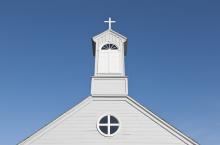
Karenna Gore: When we talk about interfaith dialogue and religions, the traditional way of doing often includes only Abrahamic religions — Islam, Judaism, and Christianity — and certainly that’s a very robust interfaith dialogue, but then when you add the non-Abrahamic traditions of Hinduism and the Indic traditions, and Buddhism and the East Asian traditions, you often have a very different conversation about whether nature itself is a subject.

IF YOU'RE LOOKING for the climate movement this year, you’ll find it at city councils arguing for 100 percent renewable energy, at pension boards demanding fossil fuel divestment, and in farm fields trying to block pipelines. But you’ll also need to track down a few ramshackle houses in swing states across the country.
Those houses will hold hundreds of young people—at least it will hold them late at night, once they’re done with the long work of knocking on doors, handing out voter guides, and going to rallies. These “movement houses” are the most visible face of the Sunrise Movement, one of those reminders that even the poisonous politics of our moment holds real possibilities.
The young people who founded Sunrise weren’t actually anticipating a Trump victory. “We had had a plan to focus on building popular support for climate change, anticipating that a Democratic president would be pushed to take action on climate if a majority of Americans wanted it and made enough noise,” Varshini Prakash, the group’s engaging spokeswoman who cut her teeth as a highly successful divestment activist at UMass Amherst, said in an interview last summer. But then came that fateful November day, and “our world turned upside-down.” Now it wasn’t about pushing Clinton harder—it was about pushing back against the desperate threat that Trump represented: to the Constitution, to vulnerable people, and to the climate, which can’t wait a decade or two for sanity to return to our national life. “When the dust settled we came to an important realization: We have to figure out how to win elections.”
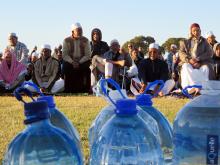
Government officials have provided scant details for Day Zero logistics. Rather than communicate a clear plan of action, some are invoking fear with comparisons to World War II and 9/11.

Perhaps climate change’s calamities will galvanize the international political scene, cracking the iron grip of the wealthy on our politics and forcing redistribution of resources. But no matter what happens, people of faith must lead the charge in envisioning a just world for all inhabitants. To slow the destruction of the earth, a fundamental reimagining of our societies is required.

A SPORTING GOODS store in a nearby town announced last week that it was closing, after many years of operation. Here’s why I think that matters, even amid all the rest.
Yes, we are living through a terrible moment in American (and planetary) history. Almost every day features two things: More cruel tweeting from the president, and more unsettling data from the real world. It is a bizarre and disheartening mix: record meanness and crudity, record windspeeds and temperatures.
We must resist, of course, and we are: The ongoing mobilization of people of good conscience is the one sweet thing about these past months. We look toward, among other things, the midterm elections as a moment when we might start to pull out of the nosedive. But resistance will not, even at its most successful, entirely erase our problems anytime soon. Long before Trump we were facing impossible inequality and impossible ice-melt. Along with resistance, we need ... neighbors.
Neighbors were optional for much of the last 50 years. We became hyper-individualists—surveys show that three-quarters of Americans have no relationship with their next-door neighbors, which is a novel situation for humans. But in the next 50 years, we’re going to need our neighbors again. The fat years are past and the lean years are upon us—even as we try to rebuild our planet against the predations of the rich and powerful, we’re going to require stronger communities for sheer survival. Ask the people trying to recover from Hurricane Harvey, from Maria, from the firestorm that raked California.

“U.S. leadership is indispensable to countering an anti-growth, energy agenda that is detrimental to U.S. economic and energy security interests. Given future global energy demand, much of the developing world will require fossil fuels, as well as other forms of energy, to power their economies and lift their people out of poverty."
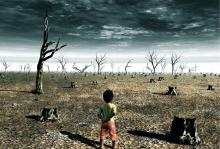
Christians often want to be good Samaritans in dealing with the symptoms of sinful systems. So we lobby for asylum seekers to be allowed into the country and we advocate for tackling climate change. The two are not unrelated — climate change can be a driver of significant migration. Consider the Carteret Islanders, who are now abandoning their homes as the rising seas swallow their islands, and seeking a new life on Papua New Guinea. And some researchers have even suggested that climate change was a factor in the Syrian crisis, as a six-year drought drove up food prices and forced people into poverty.

The "we are still in" coalition opened a 2,500-square meter (27,000-square foot) tent pavilion outside a venue in Bonn, Germany, where delegates from almost 200 nations are working on details of the pact aimed at ending the fossil fuel era by 2100.
By contrast, the U.S. government delegation office at the talks covers only 100 square meters.
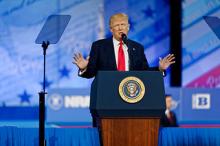
Syria announced plans to sign the Paris climate accord on Nov. 7, according to The New York Times. With Nicaragua signing the Paris Agreement in October, it leaves the U.S. as the only country to oppose the accord.

The findings directly contradict the Trump administration's policies on climate change. The Environmental Protection Agency has removed mentions of climate change from their website, with administrator Scott Pruitt denying that carbon dioxide is a primary contributor to global warming. "It begs the question, where are members of the administration getting their information from? They’re obviously not getting it from their own scientists," Philip B. Duffy, president of the Woods Hole Research Center, said.

ONE OF THE conceits of modern life is that it’s always going to work out, always going to be okay. Indeed, it’s going to be better than it ever was. But the world is testing that idea.
When Hurricane Maria slammed into Puerto Rico—its buzz-saw eye ripping from one end of the island to the other—it changed almost everything in the course of a few hours. Gone were airports and roads. Eighty percent of the island’s crops were destroyed—think of that. Almost all the cell towers: There were profound images of groups of people standing in fields where the few remaining transponders would catch a signal, desperately trying to phone friends and family. Electricity was suddenly a thing of the past, and in places likely to stay that way for six months or a year. And when you lose electricity—well, there goes AC, not to mention ice. The concept of cold disappears for a while. Modernity retreats.

WHILE OPENING a star-studded concert for victims of Hurricanes Harvey and Irma, musician Stevie Wonder remarked: “Anyone who believes that there’s no such thing as global warming must be blind.”
These two major hurricanes had just ravaged Texas, Florida, and much of the Caribbean. While scientists are cautious about ascribing causation to any individual storm, they do not hesitate to say that warming waters and altered weather patterns due to climate change will cause many more such destructive events in the future.
As we watched the horrific scenes on our television screens, one thing was clear—the most vulnerable suffer the most.
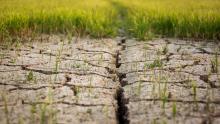
When progress we have worked so hard to achieve is being reversed, we must work to strengthen the partnerships between and among the faith community, communities of color, the environmental policy community, and the grassroots climate justice movement. We need to rebuild, inspire, and resource an American majority that recognizes the reality of climate change and seeks to stop it. The environmental movement must be more open to climate justice concerns and faith perspectives. Faith communities of color must be mobilized to view combatting climate change and building resiliency to climate change effects as central to their missions. And the resolve of sympathetic white evangelicals and Catholics — especially young people — who support action on climate change must be strengthened.

We pray for others far away
Who’ve seen destruction, too;
We look beyond ourselves, for they
Are also loved by you.